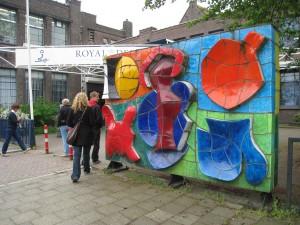
I looked forward with some enthusiasm to a tour of the famous Royal Delft pottery in Delft city. Royal Delft is the last remaining Delftware factory from the 17th century. The Delft pottery has a large sign in brightly colored ceramics to announce the entrance to the pottery.
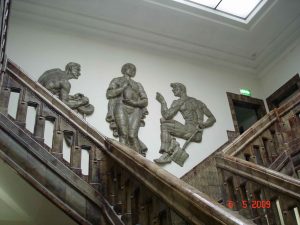
This site became the permanent home of Delft pottery in 1916. Prior to 1916 some 32 potteries spread out around the city in many locations were all part of the Delft pottery. This new site enabled the work to be carried out under one roof and allowed for expansion to meet the growing demand for building ceramics,very popular and successful in the 1920’s -30’s.
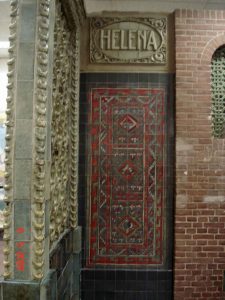
Tiled door Oriental rug design at Delft
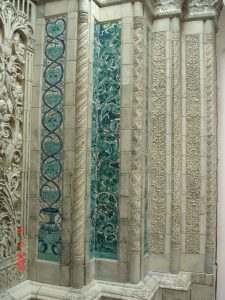
Examples of Building Ceramics Delft
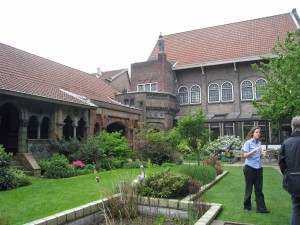
Various facades – examples of building ceramics at Delft
Building Ceramics
Many examples of the building ceramics can still be seen in famous Dutch buildings such as: the Peace Palace in The Hague; the City Hall in Rotterdam and the Stock Exchange in Amsterdam. In the great hall at the pottery is an awesome staircase made on site from ceramic tiles, very impressive. The garden at Delft factory has many beautiful and striking examples of building ceramics produced between 1895 and 1980. I was so glad we had plenty of time to look at all the wonderful ceramics and allowed photographs.
Delft Museum
In the Museum you will see the most famous tile picture made at Delft. It is an exact copy of Rembrandt’s painting the ‘Night watch’. Made from 480 tiles it took two master painters a year to complete. There is also an interesting Christmas plate collection produced in limited numbers, starting in 1915. The Christmas plate has now become a yearly tradition and collectors item.
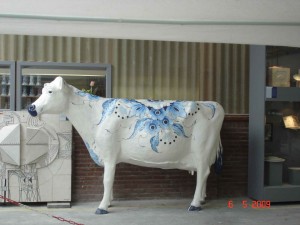
Royal Delft has three and a half centuries of history and their distinct blue and white pottery known as Delft Blue is popular all over Europe. I loved this Delft Blue cow but just a bit too large to take home as a souvenir.
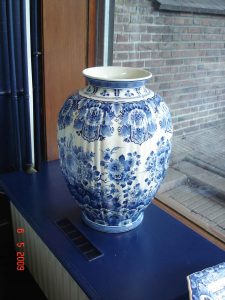
Blue and white – Delft Blue
History of Ceramics at Delft
The tour through Royal Delft covers the complete history of all the pottery and ceramics produced by Delft since 1920; as a past potter I found it fascinating to be able to see so much history on their ceramics in one place. One showcase gives examples of the four different techniques Royal Delft developed in the 17th century which are still used in the factory today :-
- The famous blue and white known as Delft Blue. 2. Polychrome a multi colored earthenware; 3. the Red,Blue and gold, also known as Pijnacker and 4. Delft Black – the Dutch version of the Japanese “Imari”earthenware inspired by Chinese lacquerware.
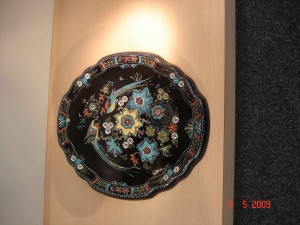
Delft Black Ware
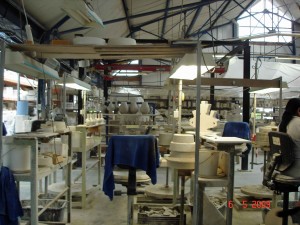
Delft factory – workshop – all gone to lunch
Delft Blue – the factory
But wait,in the factory, this is the real deal, here we viewed most of the process happening before our eyes and given a summary of each process. The tour group introduced to one of the Master Painters at work painting a clock face; painting over a white glaze with a dark pigment ready for kiln firing. The clock placed behind the piece the Master Painter is working on is the finished result after the firing, resulting in the many shades of the beautiful and famous Delft blue finish.
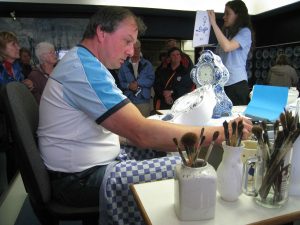
Delft also has a display of its modern collection of ceramics known as New Delft designed by artist, Jacob de Baan, as well as the popular ‘Miffy’ range designed by Dick Bruna. Unlike the traditional hand painted designs at Delft, the decoration of the modern collection made by transfer is an entirely different technique.
Couldn’t help but notice as we left the Delft factory that the rear of the building, outside walls and even the rubbish skips all decorated with Delft Blue designs, as were the local buses we saw in passing. A very interesting and impressive tour.
Related Posts:
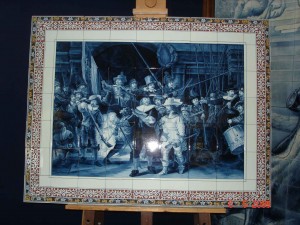
Speak Your Mind